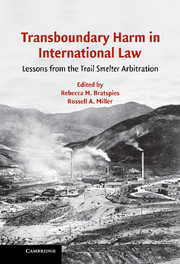Book contents
- Frontmatter
- Contents
- Contributors
- Acknowledgments
- Foreword by David D. Caron
- TRANSBOUNDARY HARM IN INTERNATIONAL LAW
- Introduction
- PART ONE THE TRAIL SMELTER ARBITRATION – HISTORY, LEGACY, AND REVIVAL
- 1 “An Outcrop of Hell”: History, Environment, and the Politics of the Trail Smelter Dispute
- 2 The Trail Smelter Dispute [Abridged]
- 3 Of Paradoxes, Precedents, and Progeny: The Trail Smelter Arbitration 65 Years Later
- 4 Pollution by Analogy: The Trial Smelter Arbitration [Abridged]
- 5 Has International Law Outgrown Trail Smelter?
- 6 The Flawed Trail Smelter Procedure: The Wrong Tribunal, the Wrong Parties, and the Wrong Law
- 7 Rereading Trail Smelter [Abridged]
- 8 Trail Smelter and the International Law Commission's Work on State Responsibility for Internationally Wrongful Acts and State Liability
- 9 Derivative versus Direct Liability as a Basis for State Liability for Transboundary Harms
- 10 Transboundary Pollution, Unilateralism, and the Limits of Extraterritorial Jurisdiction: The Second Trail Smelter Dispute
- PART TWO TRAIL SMELTER AND CONTEMPORARY TRANSBOUNDARY HARM – THE ENVIRONMENT
- PART THREE TRAIL SMELTER AND CONTEMPORARY TRANSBOUNDARY HARM – BEYOND THE ENVIRONMENT
- Annex A Convention Between the United States of America and the Dominion of Canada Relative to the Establishment of a Tribunal to Decide Questions of Indemnity and Future Regime Arising from the Operation of Smelter at Trail, British Columbia
- Annex B Trail Smelter Arbitral Tribunal Decision, April 16, 1938
- Annex C Trail Smelter Arbitral Tribunal March 11, 1941, Decision
- Index
5 - Has International Law Outgrown Trail Smelter?
Published online by Cambridge University Press: 08 September 2009
- Frontmatter
- Contents
- Contributors
- Acknowledgments
- Foreword by David D. Caron
- TRANSBOUNDARY HARM IN INTERNATIONAL LAW
- Introduction
- PART ONE THE TRAIL SMELTER ARBITRATION – HISTORY, LEGACY, AND REVIVAL
- 1 “An Outcrop of Hell”: History, Environment, and the Politics of the Trail Smelter Dispute
- 2 The Trail Smelter Dispute [Abridged]
- 3 Of Paradoxes, Precedents, and Progeny: The Trail Smelter Arbitration 65 Years Later
- 4 Pollution by Analogy: The Trial Smelter Arbitration [Abridged]
- 5 Has International Law Outgrown Trail Smelter?
- 6 The Flawed Trail Smelter Procedure: The Wrong Tribunal, the Wrong Parties, and the Wrong Law
- 7 Rereading Trail Smelter [Abridged]
- 8 Trail Smelter and the International Law Commission's Work on State Responsibility for Internationally Wrongful Acts and State Liability
- 9 Derivative versus Direct Liability as a Basis for State Liability for Transboundary Harms
- 10 Transboundary Pollution, Unilateralism, and the Limits of Extraterritorial Jurisdiction: The Second Trail Smelter Dispute
- PART TWO TRAIL SMELTER AND CONTEMPORARY TRANSBOUNDARY HARM – THE ENVIRONMENT
- PART THREE TRAIL SMELTER AND CONTEMPORARY TRANSBOUNDARY HARM – BEYOND THE ENVIRONMENT
- Annex A Convention Between the United States of America and the Dominion of Canada Relative to the Establishment of a Tribunal to Decide Questions of Indemnity and Future Regime Arising from the Operation of Smelter at Trail, British Columbia
- Annex B Trail Smelter Arbitral Tribunal Decision, April 16, 1938
- Annex C Trail Smelter Arbitral Tribunal March 11, 1941, Decision
- Index
Summary
INTRODUCTION
The Trail Smelter arbitration occupies a strange place in international environmental law. It forms part of the canon of the discipline – indeed, it is generally regarded as a foundational case – and reference to it is ubiquitous. Yet there is little agreement on how its holding should be interpreted and applied, and its persuasive value is often called into question. Trail Smelter cannot be reconciled with international rules of state responsibility, and the principle for which it appears to stand, namely, that states can be liable for transboundary environmental damage in the absence of a breach of an international obligation, holds very dubious status in international law. International environmental disputes are very rarely litigated; instead, states have invested their efforts in the creation of often very elaborate legal and policy regimes, many of which contain their own internal mechanisms for implementation, compliance, and enforcement. These considerations tend to lead one to the conclusion that international environmental law has moved beyond the Trail Smelter arbitration.
Regardless of these difficulties, the influence of the case on subsequent developments in international environmental law is not far to seek. Principle 21 of the Stockholm Declaration, which has itself taken on almost mythical proportions, is generally regarded as a reflection or restatement of the Trail Smelter holding, and the case has been relied on heavily in the work of the International Law Commission (ILC) concerning liability for harm caused by acts not prohibited by international law.
- Type
- Chapter
- Information
- Transboundary Harm in International LawLessons from the Trail Smelter Arbitration, pp. 56 - 65Publisher: Cambridge University PressPrint publication year: 2006
- 3
- Cited by



